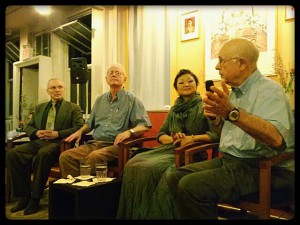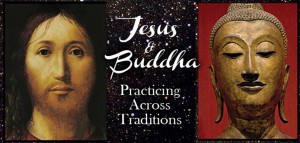Friday
Mandala ProjectsJesus and Buddha
 Interview with John Ankele, New York Shambhalian
Interview with John Ankele, New York Shambhalian
by Gwendolyn Alston
Earlier this summer, Shambhala Times had the opportunity to interview John Ankele about his new film Jesus and Buddha.
What compelled you to produce the film Jesus & Buddha?
I’ve always been interested in Jesus and Buddha as archetypes, or manifestations of the archetype of awakening. I’ve seen them in my own spiritual path as parallel figures. And I remember the kind of impetus to do this film was an article by a New Testament theologian, Marcus Borg, in which he said if Jesus and Buddha were to meet on the road they would not try to convert each other because each would understand where the other was coming from.
And it’s that basis that inspired and motivated me and my colleague to pursue the subject, Jesus and Buddha, as both being Bodhisattvas: From a Buddhist point of view; the Awakened One, the one who hears the cries of the world, the Bodhisattva, the awakened Buddha figure. And in the case of Jesus; the person for others, who binds up the brokenhearted and sets at liberty those who are oppressed.
So trying to understand how these figures from two very different cultures emerged within a few hundred years of each other, and yet the path that each took was very similar in that it was the path of awakening to another understanding of who they were and what the world was.
How did you come into contact with the three individuals who feature in the film and how did you choose them in particular to be interviewed?
 Well, each of the three in his or her own way is eminent in this ongoing dialogue between Buddhists and Christians. And what’s unique about them is that they are Christians who have become Buddhists. So I was interested in getting at the core of their own journeys: what was it in Buddhism that they thought could inform and inspire their Christianity, and what was in Christianity they felt could contribute to their understanding and practice of Buddhism?
Well, each of the three in his or her own way is eminent in this ongoing dialogue between Buddhists and Christians. And what’s unique about them is that they are Christians who have become Buddhists. So I was interested in getting at the core of their own journeys: what was it in Buddhism that they thought could inform and inspire their Christianity, and what was in Christianity they felt could contribute to their understanding and practice of Buddhism?
And each, in his or her own way, brings something unique to the discussion. Paul Knitter is an eminent Christian theologian, Roman Catholic, and former priest who left the priesthood for an academic career. He then married a Buddhist and now considers himself to be both a Buddhist and a Christian.
Hyun Kyung Chung is a Korean and Christian theologian, who is a dharma teacher in the Kwan Um School of Buddhism. She’s a scholar and an academic, but also a deep practitioner and, like Paul Knitter, a peace activist. So that brought another dimension.
And then the third figure, Robert Kennedy, was a Jesuit priest in Japan where he became engaged in a sangha with Yamada Roshi for seventeen years. Returning to the States, he continued as a Jesuit teacher and became a student of Maezumi Roshi and then Roshi Bernie Glassman, who made him a dharma successor.
So each of them has something unique to bring: one a roshi teacher, another a feminist theologian and peace activist, and then Paul Knitter, an academic — but all of them coming out of this Christian tradition.
And they talk in terms of double belonging. They feel that their religious identities are firmly rooted in both Buddhism and Christianity.
What’s your take on this? What is your relationship to each of these people and to that idea of practicing across these two traditions?
Well, it’s been my path also. I come from an academic theological background. I attended a seminary and was ordained in the Presbyterian Church. At the same time, thirty years ago or so, I began practicing in the Buddhist tradition.
And for me it was never a conflict. They were never in opposition. It was rather a matter of integrating both into my own spiritual journey. I never felt a conflict because I never thought of Jesus and Buddha as in any way standing in opposition to each other.
You’ve shown this film in quite a number of venues, what kind of impact did the film have?
It’s very encouraging because it’s all been very positive and illuminating. I think it speaks to that same interior dialogue that people have come out of, whether from a Jewish or Christian background; still that conversation continues within them. And sometimes, you know, religious institutions require that one identify with them solely and that becomes a source of stress, frustration and conflict.
But this film is trying to speak to that nexus where both traditions meet in a way that helps people open to their own journey and understanding, helping them incorporate both in a way that’s affirming and in which
‘Jesus & Buddha’ has had a very good reception amongst the audiences. It’s also a best-selling DVD on your Website. Why do you think this film is selling so well?
Well, I think for me personally, we called it Jesus & Buddha because we wanted to be explicit: this is our attempt to advance the dialogue between Buddhists and Christians. So it’s very clear there in the title. We are looking at getting to the essence of what this dialogue can contribute on a very personal level.
Buddhists would say it addresses the Great Matter, which is the matter of life and death and the question of who am I? What is this life? Or from a Jewish or Christian point of view it would be the existential questions at the root of one’s own faith tradition and spiritual journey.
So I think that’s the value of it, and I think that’s what’s drawn people to it and what’s behind the enthusiasm that the film has engendered.
Is there anything in particular, anything else that you’d like to say about the film or about Buddhism, about your relationship to these practices?
Well, I think one of the things that the film is very effective in doing is bringing together the question of personal transformation with social transformation. On the one hand Christianity and Judaism have in the past been focused on how they could be engaged with the world in a transformative way – the prophetic traditions, concern for social justice and the well-being of people who have been marginalized – to address those concerns through public policy and through activism.
On the other hand, Buddhism has emphasized personal transformation. So we have the social aspect of change and the personal aspect of change coming together in a way in which each can support and inform the other: helping the other to evoke what is of value in their own tradition in terms of personal and social transformation and how they come together.
I think Buddhists have a lot to learn from the monotheistic traditions – Judaism, Christianity, Islam – and Christians have a lot to learn from the Buddhists as far as practice goes: How to break out of the circumscribed ego so that we can see the self as a much larger reality, one that embraces the whole world, all of nature and all sentient beings.
So I think it’s an important dialogue to be having at this stage, when things are in flux and there’s so much heartache and trouble in the world. It’s been a satisfying journey to be a part of, and I feel that it’s ongoing for me.
Thank you, John
Jesus and Buddha





Aug 10, 2013
Reply
Shambala Sun is homoginized Buddhism. The Dharma should not be made a pass time